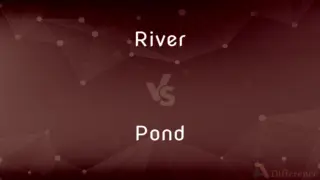Scrod vs. Haddock — What's the Difference?
By Tayyaba Rehman & Maham Liaqat — Updated on April 8, 2024
Scrod refers to young, small cod or haddock, often used in New England cuisine, while haddock is a specific species of marine fish, known for its mild flavor and firm texture.

Difference Between Scrod and Haddock
Table of Contents
ADVERTISEMENT
Key Differences
Scrod is a term popular in the culinary world, especially in New England, referring to young, small cod or haddock that are typically less than 2.5 pounds. The term is more about the size and preparation of the fish rather than a specific species. In contrast, haddock is a distinct species of fish found in the North Atlantic, highly prized for its lean, white flesh and subtle sweetness, making it a favorite in various seafood dishes.
While "scrod" can be either young cod or haddock, it is important to note that haddock itself has a specific taste and texture profile. Haddock's flesh is slightly sweeter and more delicate than that of cod, and it features a recognizable black line running along its white side. This differs from scrod, which could vary slightly in taste and texture depending on whether it is cod or haddock.
In culinary contexts, scrod is often presented as a fillet or in pieces, prepared through baking, broiling, or frying. It's a term that you might come across on menus, particularly in seafood restaurants in the New England area, signifying a dish made from young, tender fish. On the other hand, haddock can be prepared in similar ways but is also popular in smoked forms, such as the traditional Scottish Finnan haddie, or as a key ingredient in British fish and chips.
Conservation status and fishing practices for both haddock and cod (thus affecting scrod) have been points of discussion. Haddock fisheries have seen various levels of sustainability, with efforts in place to prevent overfishing and ensure the species' long-term viability. The use of the term "scrod" does not specifically address conservation practices but implies a younger, potentially more sustainable catch due to its smaller size.
Both scrod and haddock play important roles in culinary traditions, particularly in the northeastern United States and Atlantic Canada. While scrod highlights the use of young fish in cuisine, haddock remains a specific, sought-after species for its distinct flavor and versatility in dishes.
ADVERTISEMENT
Comparison Chart
Definition
Refers to young, small cod or haddock.
A specific species of marine fish.
Origin
Culinary term, especially used in New England.
Found in the North Atlantic.
Taste & Texture
Can vary slightly, generally mild and tender.
Mild, slightly sweet, with a firm texture.
Preparation
Baked, broiled, fried.
Versatile, including smoked and fried.
Size
Typically less than 2.5 pounds.
Larger than scrod; size varies with age.
Conservation
Dependent on the species (cod or haddock).
Subject to sustainable fishing practices.
Culinary Role
Often appears on menus in seafood restaurants.
Popular in dishes like fish and chips.
Compare with Definitions
Scrod
Suitable for baking, broiling, or frying.
The scrod was broiled to perfection with a lemon butter sauce.
Haddock
Slightly sweeter and more delicate than cod.
The mild sweetness of haddock makes it ideal for fish and chips.
Scrod
Indicates smaller, tender fish suitable for various dishes.
Scrod is often selected for its delicate texture.
Haddock
Recognizable by its black lateral line.
The haddock's black line makes it easy to identify.
Scrod
Young, small cod or haddock used in cuisine.
The chef prepared a delicious baked scrod for dinner.
Haddock
Managed through quotas and sustainable practices.
Haddock fisheries adhere to regulations to ensure the species' future.
Scrod
Emphasizes the use of young fish.
Scrod is a testament to the tradition of using fresh, young fish in cooking.
Haddock
A marine fish species known for its mild flavor.
Haddock is a staple in Atlantic seafood cuisine.
Scrod
A common term in New England seafood restaurants.
Scrod featured prominently on the restaurant's menu.
Haddock
Can be smoked, fried, or baked.
Smoked haddock is a key ingredient in traditional kedgeree.
Scrod
Scrod or schrod () is a small cod or haddock, and sometimes other whitefish, used as food. It is usually served as a fillet, though formerly it was often split instead.
Haddock
The haddock (Melanogrammus aeglefinus) is a saltwater ray-finned fish from the family Gadidae, the true cods. It is the only species in the monotypic genus Melanogrammus.
Scrod
A small cod or similar fish, such as haddock or hake, especially one split and boned for cooking.
Haddock
A silvery-grey bottom-dwelling fish of North Atlantic coastal waters, related to the cod. It is popular as a food fish and is of great commercial value.
Scrod
Any cod, pollock, haddock, or other whitefish.
Haddock
A food fish (Melanogrammus aeglefinus) of northern Atlantic waters, closely related to and resembling the cod, but having a dark spot above each pectoral fin.
Scrod
(transitive) To shred.
Haddock
A marine fish, Melanogrammus aeglefinus, of the North Atlantic, important as a food fish.
Scrod
A young codfish, especially when cut open on the back and dressed.
Haddock
A marine food fish (Melanogrammus æglefinus), allied to the cod, inhabiting the northern coasts of Europe and America. It has a dark lateral line and a black spot on each side of the body, just back of the gills. Galled also haddie, and dickie.
Scrod
Flesh of young Atlantic cod weighing up to 2 pounds; also young haddock and pollock; often broiled
Haddock
Lean white flesh of fish similar to but smaller than cod; usually baked or poached or as fillets sauteed or fried
Scrod
Young Atlantic cod or haddock especially one split and boned for cooking
Haddock
Important food fish on both sides of the Atlantic; related to cod but usually smaller
Common Curiosities
Can I substitute haddock for scrod in a recipe?
Yes, since scrod can be young haddock, haddock can generally be used as a substitute in recipes calling for scrod.
What exactly is scrod?
Scrod refers to young, small cod or haddock, typically used in New England cuisine.
How does the taste of scrod compare to haddock?
Scrod's taste can vary slightly depending on whether it's cod or haddock; haddock is mildly sweet and delicate.
What makes haddock a popular choice for fish and chips?
Its mild flavor, slightly sweet taste, and firm texture make it ideal for frying, a key component of fish and chips.
Is there a size difference between scrod and haddock?
Yes, scrod refers to younger, smaller fish, while haddock can grow larger and varies in size with age.
How can I tell if a fish is haddock?
Haddock can be identified by its white side and a distinctive black lateral line.
What are the sustainability concerns with cod and haddock fisheries?
Overfishing and habitat damage are major concerns, with efforts in place to manage fish populations sustainably.
Is scrod a specific type of fish?
No, scrod is a term that can refer to either young cod or haddock, not a distinct species.
Why is sustainable fishing important for haddock?
Sustainable fishing ensures the long-term viability of the haddock population, preventing overfishing and promoting ecosystem health.
How should I prepare scrod?
Scrod can be prepared in various ways, including baking, broiling, and frying, often with light seasonings.
Share Your Discovery

Previous Comparison
River vs. Pond
Next Comparison
Crowd vs. AudienceAuthor Spotlight
Written by
Tayyaba RehmanTayyaba Rehman is a distinguished writer, currently serving as a primary contributor to askdifference.com. As a researcher in semantics and etymology, Tayyaba's passion for the complexity of languages and their distinctions has found a perfect home on the platform. Tayyaba delves into the intricacies of language, distinguishing between commonly confused words and phrases, thereby providing clarity for readers worldwide.
Co-written by
Maham Liaqat















































